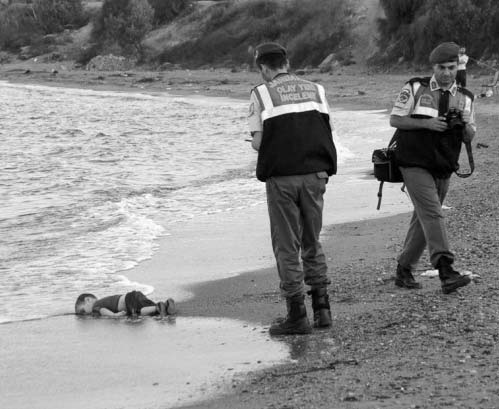 |
| ▲ Syrian kid found dead on the beach. |
Tens of thousands of migrants and refugees, mostly fleeing unrest in the Middle East and Africa, are pushing their way through the Balkans to Hungary. From there, many of them are continuing their desperate trip to Europe, Germany in particular, and other countries further away in the north. The photo of the deceased Syrian child that you might have seen on the news is a typical example of the plight of these migrants. The helpless are trying to reach Europe to escape from civil war and political dangers, but they’re having difficulty getting out of their country and reaching a safe destination. The Dankook Herald (DKH) looked closely into the details of the challenges they face and the countries that are taking them in.
Many people mistakenly believe that refugees only occur in Africa. However refugees also came from Europe not too long ago. Before the 18th century, there was no definition for a refugee. Nevertheless with the rise of romantic nationalism in Europe, the concept of one’s nationality became important. It made tracking the mass movement of a country’s people soon became a prominent occurrence. For example, as a result of a number of Jewish persecutions in Eastern Europe that started in 1881, Jews immigrated on a large scale to other parts of the world. The Second World War further forced the escalation of their migration. On December 14, 1950, The United Nations High Commissioner for Refugees (UNHCR) helped protect refugees, repatriating or establishing resettlement for many in Geneva, Switzerland.
Nowadays, Germany is fast becoming a national refugee camp. This year they accept 8000 refugees. Why do they do it? Germany said it is their reflection of the impact of war on people that motivates them. Refugees are paid 143 to 216 Euros in cash every month and are guaranteed food, a residence, and medical support to meet their basic needs. However not every German wants to help the refugees. In Dortmund, local extremists held rallies in opposition to the admittance of refugees in the country while the Social Democratic Party believes that the refugee camps are at risk of terror from extremists. The German government said the refugee crisis is the biggest challenge they have faced since German reunification and they demanded the help of other European Union (EU) countries in assisting in the resettlement of refugees.
Migrants from Middle Eastern countries have mostly became refugees because of Islamic State of Iraq and Syria (ISIS). Currently, ISIS is attacking countries such as Syria and Iraq as they are vulnerable either from currently undergoing or recovering from a civil war. These countries aren’t stable enough to initiate decisive action against ISIS. Consequently, the citizens are suffering. As a result, those caught in the crossfire head to Europe in search of a better and safer life. The big four countries that have been accepting refugees are Germany, Sweden, Italy, and France. These four countries are handling 65% of all refugees arriving in Europe. However, because of the Dublin Convention, which ruled that the nation where the refugees first land must take care of them, most of the refugees have been assigned to border nations such as Italy, Spain, Greece and Poland. Many European countries are insisting this convention is useless and therefore has to be abolished with a new one that allocates refugees according to a country’s economic capacity taking its place.
To learn more about this problem, the DKH interviewed Prof. Cho Han-seung (Dept. of Political Science and International Relations). Prof. Cho explained the overall situation of the refugees and highlighted possible solutions.
He explained there were many reasons why refugees headed to Europe. Once in the EU, they can stay freely in any EU country and most of them can speak English or French because of their colonial history. He also pointed out that as the number of refugees increases, it has become clear that many EU countries have different stances on the matter. Their main reason for accepting or rejecting refugees is the problem of job opportunities. For instance he explained that in Germany, their willingness to take in refugees was more about resolving a labor shortage than expressing a tolerant and charitable attitude towards refugees. On the other hand, the UK is uncomfortable accepting more refugees, because they have already reached a saturation point in their population.
The EU needs to make fast and accurate decisions to resolve the current refugee problem. Moreover, countries with refugees have to find solution in the form of a long term policy. While the number of refugees around the world is increasing and more and more are heading to Europe, you can never be sure they’ll keep on their same path. In the future, when Korea becomes a leading country in Asia, the refugees might look to us for relocation. So we don’t suffer the consequences in the future, we should start preparing now for how we would handle a problem like this in the future.
박세훈, 이정하 dkherald@hotmail.com

![[Campus Magnifier] Let's Surf the Library!](/news/photo/202404/12496_1765_4143.jpg) [Campus Magnifier] Let's Surf the Library!
[Campus Magnifier] Let's Surf the Library!
![[Campus Magnifier] Let's Surf the Library!](/news/thumbnail/202404/12496_1765_4143_v150.jpg)





